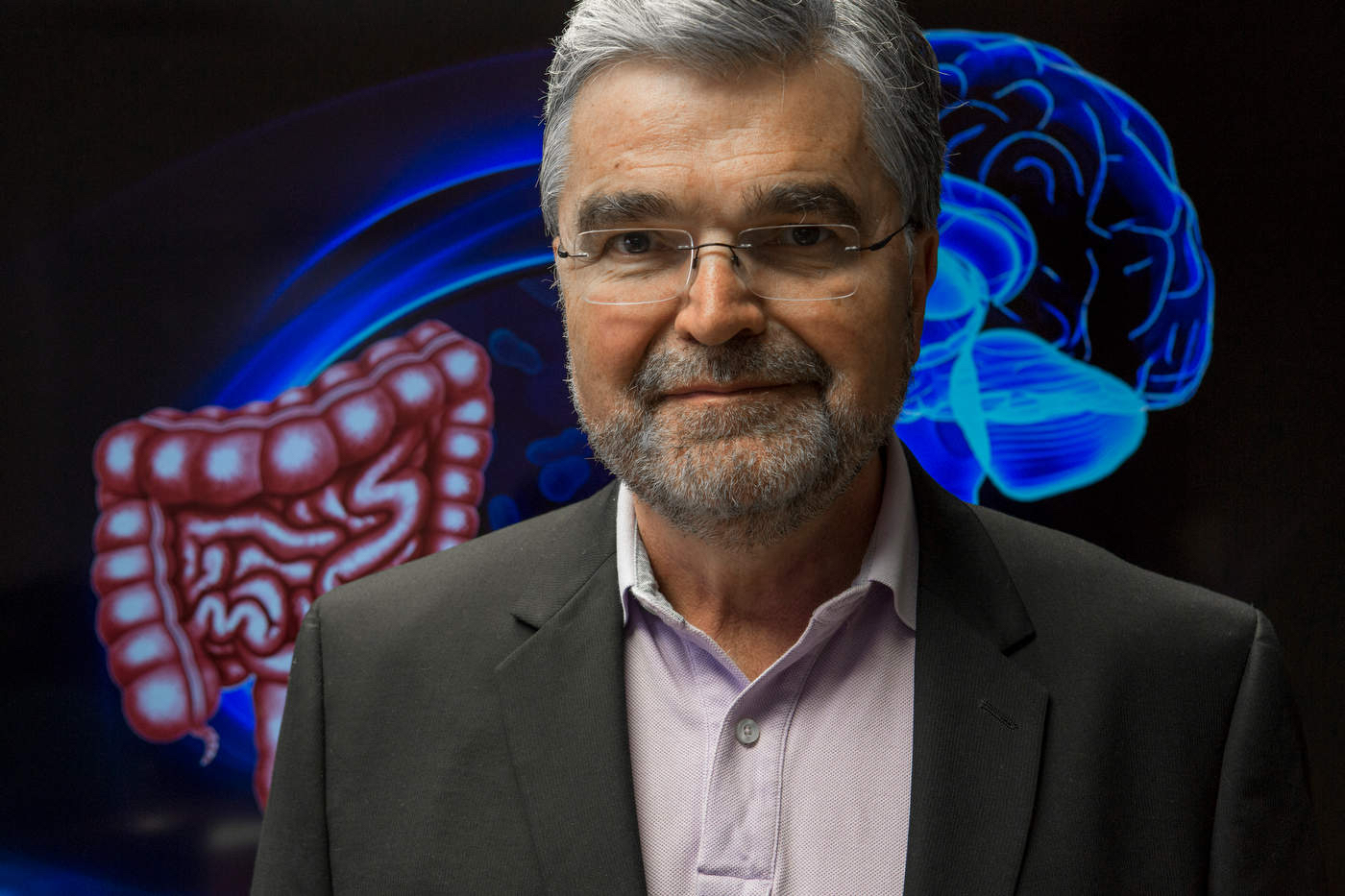Dr. Emeran Mayer is a gastroenterologist who specialises in the communication between the brain, the gut and our environment. He is widely recognised as a pioneer of medical research into the brain, gut and microbe interactions and author of “The Mind-Gut Connection: How the Hidden Conversation Within Our Bodies Impacts our Mood, Our Choices and Our Overall Health.” (Our conversation has been condensed and edited for clarity.)
You discuss in your book, ‘The Mind-Gut Connection’, the journey you took at medical school to study the link between the brain and body in disease. What was the prevailing thought at the time and how were you going against it?
When I got into medical school, I was interested in studying the biological underpinnings of psychological constructs. When looking for a thesis advisor, I went from one professor to the next and they all said that mind gut connections can’t be studied even though they knew it was important. After doing a rotation in gastroenterology at the Mass General Hospital at Harvard I was convinced that I wanted to study how the brain interacts with the digestive system. It was surprising to me how big the disconnect was between psychological and holistic concepts and traditional medicine at the time. Coventional Medicine selected people who were interested in mechanical, linear concepts of disease rather than an interest in health as a complex whole.
What is this mechanical, linear view of traditional medicine and why is it not sufficient in treating disease?
The linear viewpoint of the world around us represents the whole paradigm of the Western World. We go from point A to point B and don’t look at the holistic context in which this interaction is happening. This model has been very successful in surgery in treating infectious diseases, where you identify a pathogen and develop an antibiotic to kill it. In reality, chronic diseases are not linear phenomena. Chronic diseases are dysregulations of a whole network, in which every organ in the body is interconnected, including the brain. For instance, if you are suffering from obesity, you also have a high risk of metabolic syndrome, of cardiovascular, liver and brain disease and cancer. This is no longer a linear phenomenon. You are looking at a paradigm of interconnectedness of every organ in the body. Chronic disease is a rearrangement in this global network that links every cell in our bodies together. Western medicine has not recognised that and as a result, nearly half of the US population are on chronic medicines. We are clearly not healing the disease. We are treating the symptoms and suppressing the issue.
How would you describe your approach to disease?
My view is a systems biology approach. I look at the connections between every part of the body, down to every cell. For instance, if you look at genes, initially we thought that a single gene determines how old you are going to get. Now we know that it is a whole network of genes. It’s the same with microbes. We have a hundred trillion microbes in our gut. We have to apply a systems approach of interconnectedness to understand and model it. In chronic disease, the systems go way beyond our bodies. The microbes in your gut live off the food systems from which you get your food, for instance the plants in the soil. And if you pursue this consistently, you all of a sudden see that we are all part of this gigantic interconnected system. I think what is happening with these viral epidemics is in some ways a systems phenomenon. We are attacking the normal system by cutting down the forests, encroaching on ecological niches of wild animals, and overcrowding in cities. And the way these diseases spread is not linear either. The whole world and system is affected.
Why did you decide to focus your research specifically on the connection between the brain and the gut?
From an evolutionary standpoint, our nervous system and our gut were always very closely connected, more so than any other organ. The first primitive organisms were simply a floating digestive tube with a nerve net around them. This basic architecture persisted through millions of years, and we still have a similar design in our gut. I think if you had to choose two organs that are the core of our being I would say it is the gut and the brain. The gut itself is not just a digestive tube, it is also the immune system, the nervous system, and the endocrine system. Contrary to popular belief, 95% of our body’s serotonin is stored in our gut. We interact with the world more through our gut than we do with our skin.
Why are there so many hormones such as serotonin stored in our gut?
We still don’t know the full answer to this question. On the one side, the serotonin that is released in the gut communicates with the brain by stimulating the vagus nerve. Serotonin is only one molecule; tryptophan is broken down by the microbes and cells in the gut into many molecules, one of which is serotonin. The ratio of serotonin to some of the other tryptophan metabolites is influenced by microbial activities. The microbes can talk to some of the cells lining our gut and tell them to make more serotonin and release it onto the vagus nerve, which carries the signal to the brain. It also is released back into the gut and influences the behaviour of the microbes, so it’s going full circle. The molecule that allows microbes to take up the serotonin is the same molecule that acts when you take an antidepressant. We are still at the beginning of understanding the mechanisms of this. What we do know for now is that there is a major link between what we eat, what the microbes do with our food and how it affects brain function.
As well as the link between what we eat, our gut and brain function, you also discuss the effects of negative emotions such as stress on our body. What effect does this have in our gut?
Everybody now talks about the healthy diet and what it does to your gut and microbiome. Very few people talk about the fact that negative emotions in the brain can do almost the same damage as unhealthy food. Chronic stress decreases the diversity of your microbes, and changes the behaviour and leakiness of your gut. Your gut is a mirror image of your emotions. We don’t listen and sense the effects of negative emotions or food on our gut on a daily basis. We tend to only notice the effects when we are in a lot of pain. People talk about the negative effects of the Western diet and obesity on cancer. You can imagine the combination of negative emotions and stress, plus the Western diet, will have twice the effect on increasing your risk of chronic disease. Typically in Western medicine, we don’t pay too much attention to the mind but it is really key to realise this importance.
You also discuss how those with a positive attitude to life tend to heal faster from disease. What is the explanation behind this?
This comes back to the concept of our body as an interconnected network. How this network is constructed in our lives, determines how resilient it is to disease. This is shaped early in life, in the first two years of our lives for the microbiome and the first 18 years for the brain. The way this is programmed determines your resilience later in life. If framed in a positive way, such as with grit, enthusiasm, passion, compassion, and with the right diet, you are likely to be more resilient later in life. It offers an explanation for chronic diseases and longevity, determining how long we live and how healthy we are. As humans, we have this amazing ability to learn, our prefrontal cortex is incredibly plastic, providing our body with the opportunity to adapt and change to varying situations. I think our health ultimately all comes down to attitude and diet.
Follow us here and subscribe here for all the latest news on how you can keep Thriving.
Stay up to date or catch-up on all our podcasts with Arianna Huffington here.


